Subscriber Benefit
As a subscriber you can listen to articles at work, in the car, or while you work out. Subscribe NowThis is the first article in a series about Indiana's legal community and the turbulent economy.
Indiana's recreational vehicle industry has seen better days – thousands of workers have lost their jobs, manufacturers and dealers are shutting doors, sales have plummeted, and consumers just aren't buying the fuel-hungry road giants anymore.
But just because an industry is struggling doesn't mean the attorneys practicing in that area of law are feeling the same pain. Attorneys representing clients in the economically battered RV industry aren't seeing those layoffs and downturns trickle into their worlds, but instead are adapting to new types of work coming their way as a result. It's a trend that shows just how capable the Hoosier legal community is in evolving as the economy falters and impacts their practice areas.
Let the RV industry and its attorneys tell that story.
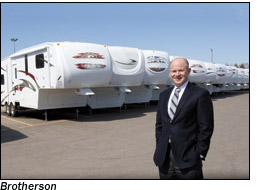
"There's no way to sugarcoat this â?¦ it's a stressful time, just like it is in so many industries right now," said partner Jim Brotherson, who works in the RV Focus group at the South Bend office of Baker & Daniels. "We've thought about this a lot, the extra amount of work we're being called to do by clients that is because of the current economic conditions."
Those figures aren't pretty for northern Indiana, known as the RV capital that makes more of the vehicles than anywhere else in the country. The bleak picture is caused by a national slump in sales resulting from high fuel and commodities prices, as well as the more recent financial crisis that's limited resources and prevented people from being able to buy the travel trailers. About 3,000 job cuts have slammed the region and driven up the unemployment rate significantly, and several suppliers and dealers that have existed for decades have had to close.
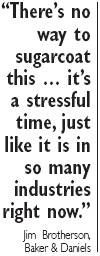 Economists predict a rough economy overall for Indiana next year, a direct result of the housing market crash, financial sector meltdown, and rising energy prices. The state has seen five consecutive months of job losses, the longest streak since employment hit bottom in summer 2003, and statewide unemployment is approaching 7 percent.
Economists predict a rough economy overall for Indiana next year, a direct result of the housing market crash, financial sector meltdown, and rising energy prices. The state has seen five consecutive months of job losses, the longest streak since employment hit bottom in summer 2003, and statewide unemployment is approaching 7 percent.
For the legal world, impacts vary depending on the type of practice. Attorneys handling intellectual property, international, and employment law are seeing more business as companies shift their focuses to those areas, even as bankruptcy and foreclosure lawyers are seeing a wave of business as more filings materialize in the faltering economy. Simultaneously, areas such as corporate and small business, construction, and banking law are struggling as those focuses aren't as hot on the list as they are during better economic times.
"Whenever the economy goes in the tank as it recently has, workers who have been fired, laid off, or otherwise find themselves unemployed or underemployed seem to be more willing to seek out lawyers to pursue employment-related claims against their employers or former employers," said William Groth, a partner at Indianapolis-based Fillenwarth Dennerline Groth & Towe.
Those practicing in the RV arena seem to represent what's happening throughout the legal community as far as practice 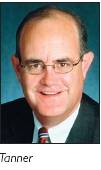 groups' ups and downs. Baker & Daniels formed its RV Focus group two years ago, and now more than 40 attorneys coordinate their respective expertise in varying areas of law, working with the 16 who regularly work in that group. Despite the economic downturn, the firm has more than doubled the number of attorneys handling those types of issues specific to the troubled RV industry, Brotherson and his colleagues say.
groups' ups and downs. Baker & Daniels formed its RV Focus group two years ago, and now more than 40 attorneys coordinate their respective expertise in varying areas of law, working with the 16 who regularly work in that group. Despite the economic downturn, the firm has more than doubled the number of attorneys handling those types of issues specific to the troubled RV industry, Brotherson and his colleagues say.
"We've seen downturns like this through the decades, though we haven't seen anything like this since the late 80s," said Baker & Daniels attorney Ken Weaver in South Bend, who has been working in this area for four decades and is past chairman of the Recreational Vehicle Industry Association. "Each time, the volume of legal work doesn't change much or it does go up some, but the nature of the work changes."
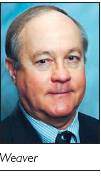 Weaver remembers how some companies shrunk from 2,500 to 400 employees in a few months back in the 1970s after the fuel shortage, but it recovered. He knows it will again, the same as other areas being slammed at the moment.
Weaver remembers how some companies shrunk from 2,500 to 400 employees in a few months back in the 1970s after the fuel shortage, but it recovered. He knows it will again, the same as other areas being slammed at the moment.
Prior to the economic and financial crisis, the RV industry saw higher sales because of consumers wanting to buy vacation vehicles, the attorneys said. Preventing litigation and handling corporate law issues were common functions, as well as knowing transportation and industry-specific manufacturing or safety law.
Companies continue to be proactive and prevent litigation, according to Joe Tanner in Indianapolis, a part of the Baker & Daniels practice group. He's being called more to polish up documents in order to avoid litigation, and companies want to re-examine warranty and dealer or supplier documents for warranty claims because of the economic uncertainties. Excess capacity is being squeezed out because consumers are buying fewer vehicles, and industry leaders are dealing with that issue.
RV attorneys are counseling more clients about federal notice laws about what's required when making sharp cutbacks and layoffs, Brotherson said. He's been at the table for manufacturer and industry closings, and he said the topic has come up often. One company had to layoff some sales representatives and another wanted to strengthen its administrative and sales areas, so the latter was able to sweep up that talent leaving the first company, he said.
"That kind of change in employment relationships is one that wouldn't have happened outside the current economic situation," he said. "What doesn't make the news is the supplier that has to lay off 10 people, and while it's not a huge newsmaker, it still means we're doing the legal work."
A key issue in recent years has been more focus on fuel efficiency because of rising oil costs, something that was compounded with the 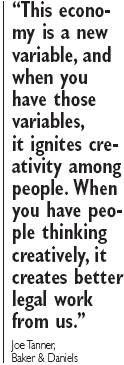 economics in the past year. Now, that's become an even more important task combining various areas of the law and one that may offer a glimpse of what's to come for the industry as a whole, attorneys say.
economics in the past year. Now, that's become an even more important task combining various areas of the law and one that may offer a glimpse of what's to come for the industry as a whole, attorneys say.
"A huge premium on innovation has been born not just because of the economic malaise, but also because of a general concern about the price of fuel and availability," said Steve Hazelrigg in Fort Wayne. "That fuel aspect would be going on even without the economic situation right now, but this all has presented an opportunity for the industry to innovate to make RVs more fuel efficient."
 For example, the industry is looking more closely at European manufacturers and improving relations with those RV makers, dealers, and suppliers overseas. Hazelrigg pointed out the smallest U.S. RVs are twice the size of the largest ones produced in Europe.
For example, the industry is looking more closely at European manufacturers and improving relations with those RV makers, dealers, and suppliers overseas. Hazelrigg pointed out the smallest U.S. RVs are twice the size of the largest ones produced in Europe.
"We may see lighter products in the future because that's what consumers can afford to fill up with gas," he said. "From the supplier side, we see them struggling to invent stronger component parts to create the better fuel efficiency."
The attorneys have recruited colleagues with international law and global experience, something that didn't happen when the Baker & Daniels practice group first materialized, the attorneys say. The regular RV attorneys have been working more closely with intellectual property lawyers because of the economic troubles, they say. As layoffs happen and manufacturers and suppliers struggle to cut costs and stay afloat, more creative products are being contemplated and those ideas face a higher risk of being stolen by competitors.
â
All show how the practice group is adapting to the changes and reaching more deeply into the law firm's expertise to provide services that are needed. With history on their side, the RV attorneys are confident the industry and their practices will survive.
"The industry has been through this before, and we've always come through stronger and better," Tanner said. "This economy is a new variable, and when you have those variables, it ignites creativity among people. When you have people thinking creatively, it creates better legal work from us. That's what we like to do, so ultimately this creates a good environment to do our business."
Brotherson said he expects that in the next year there will be an increased demand for RV lawyers, as well as attorneys specializing in other hard-hit industries and fields.
"That's simply a function of the general tumult in the national economy," he said. "There's no question in my mind that that our industry will recover, and I'd be shocked if it looked like it does today. I'm not sure what it may look like, but because of all this, the lawyers must be at the table and helping with whatever guidance our clients need."
Please enable JavaScript to view this content.
